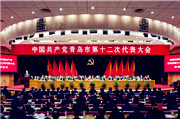Port city's modern economy places it in trillion-yuan club
By Zhang Zhao ( China Daily )
Updated: 2017-03-07
|
|||||||||
Its GDP surpassed the milestone for the first time in 2016, thanks to advanced industrial expansion driven by internet technologies and infrastructure spending, Zhang Zhao reports.
The government of Qingdao, Shandong province, has announced that the city's annual GDP reached 1 trillion yuan ($144.9 billion) last year, becoming the 12th city to achieve this nationwide and the third in northern China after Beijing and Tianjin, joining the ranks of the "trillion-yuan club".
Qingdao's GDP surpassed that of more than 100 countries and regions in the world.
Its high-tech sectors, including pharmaceuticals, computing and telecommunications, as well as e-commerce, have developed robustly, according to news provider Bloomberg, with the city's service industries growing by 9.2 percent year-on-year and contributing 54.7 percent of the city's GDP in 2016.

One of the reasons for Qingdao's economic success amid the wider macroeconomic slowdown is its continuous focus on the real economy, according to local government officials.
"It has been proven that economic stability relies on the real economy and we must attach great importance to the real economy at all times," said the city's Party chief Li Qun, who said the local government has also been paying close attention to the optimization of the manufacturing industry.
Advancing the modern
The government invested nearly 264 billion yuan last year to eliminate outmoded production capacity as part of 436 industrial projects.
At the same time, it introduced advanced technology to develop 10 new industrial chains, including machinery equipment, electronics and rail transit, each with at least 100 billion yuan of annual output value.
These 10 industries generated a total output of 1.4 trillion yuan in 2016, up 6.4 percent from the year before.
Qingdao-based companies have developed CRH380A electric multiple unit trains, pipe-laying ships for deep-sea oil platforms and a heat pump system that extracts heat from sewage and seawater. More than 60 percent of the high-speed train units in China are produced in Qingdao.
High-speed train units and high-end machinery equipment have replaced cement and textiles to become the new star products exported from the Qingdao port.
In addition, many large industrial projects have been introduced to the city, such as an auto factory of FAW Group and a helicopter assembly facility for Airbus, leading to the development of high-end manufacturing industry chains.
The government believes the internet will be key in supporting this industrial development and has introduced many projects from domestic and international IT giants, including Huawei Technologies, Inspur, Hewlett-Packard and Amazon.
The annual World Internet+Industry Conference has been held in Qingdao since 2015.
Optimized urban planning and integrated use of land and sea resources have helped to achieve the city's trillion yuan GDP, said Sui Yinghui, a researcher at the Qingdao Academy of Social Sciences.
The 303-kilometer Qingdao-Rongcheng railway line, which opened on Nov 16 of 2016 as the first intercity express, has joined Qingdao and the nearby cities of Yantai and Weihai in a one-hour circle.
"The express will greatly promote the rapid flow of capital, technology and human resources in the area, and facilitate the integrated development of the Shandong Peninsula," said Leng Jing, deputy chief of the urban development institute at the Qingdao Academy of Social Sciences.
In 2011, the State Council approved the development plan for a "blue economic zone" on the Shandong Peninsula, where Qingdao is located. The plan was the first in China to focus on an ocean-based economy.
The "blue economy' contributed more than one-fourth of Qingdao's GDP last year.
The Qingdao West Coast New Area, established in June 2014, is a national-level strategy and home to a number of major industrial chains, each with at least 100 billion yuan in annual industrial output.
As the ninth national-level new area, it generated GDP of nearly 290 billion yuan last year, increasing over 12 times from the year before.
The Dongjiakou Port in the area has become the world's largest ore port and China's largest crude oil port.
The bonded zone in the area has attracted more than 1,000 projects, with investments totaling close to 1 trillion yuan. Global Fortune 500 companies invested in more than 40 related projects last year, taking the total number to 193.
The first cross-border e-commerce park in the province started operations last year.
The area's import and export volume has exceeded $80 billion over the past for years.
Contact the writer at zhangzhao@chinadaily.com.cn
|
Employees work at the Dongjiakou Port, the world's largest ore port and China's largest crude oil port.Photos Provided To China Daily |
|
The robust economy and charming environment in Qingdao, Shandong province, have attracted a host of well-known global companies to establish business and headquarters in the coastal city. |
(China Daily 03/07/2017 page11)






